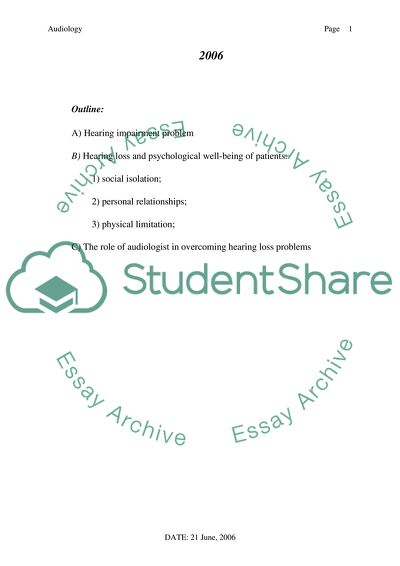
- Home
- Free Samples
- Premium Essays
- Editing Services
- Extra Tools
- Essay Writing Help
- About Us
- Studentshare
- Subjects
- Miscellaneous
- Audiology
Audiology - Essay Example

- Subject: Miscellaneous
- Type: Essay
- Level: Undergraduate
- Pages: 4 (1000 words)
- Downloads: 0
- Author: lizzieohara
Extract of sample "Audiology"
The report of the Royal National Institute for the Deaf reveals that people with hearing impairments seeking treatment in hospitals find it difficult to communicate with NHS staff. (Thomas, 2005) That’s why it is very important to highlight the problem of psychological well-being of people with hearing loss. Hearing impairment can cause serious social, emotional and communicational dysfunction. It is often accompanied by depression, paranoia and drop in social activities. Patients who received treatment on hearing loss report better mental health and improvement of interpersonal relations.
(Cook & Hawkins, 2006) People who lost hearing are hard to understand and follow a doctors advice or respond to warnings. Its effect on speech communication can reduce a persons physical, functional, emotional, and social well-being. (Rados, 2005) Audiologists report that many their patients confess that they don’t attend social events and family gatherings, simply because of the difficulty to hear and understand conversation. The problem with hearing limits a person in a variety of ways. That’s why it can be traumatic and cause feelings akin to grief and loss.
People with hearing impairments participate less in social activities. Active personalities are particularly bound to notice it. (Burkey, 2003) Communication problems resulting from hearing loss can also impede medical treatment, strain family relations, and limit or restrict previously enjoyed activities (Weinstein, 1991b in Thompson, 1993). People prefer to withdraw socially rather than face embarrassment from frequent misunderstandings of statements and inappropriate responses. People with hearing loss tend to be non-communicative than trying to answer question.
(Thompson, 1993) People with hearing impairment are unlikely to participate in social activates because of the loss of independence and certainty leading to dissatisfaction with
...Download file to see next pages Read MoreCHECK THESE SAMPLES OF Audiology
Learning Disabilities
The Examination of the Patients Ears to Prepare for Tympanometry
BECOMING AN AUDIOLOGIST
ASHA - advocacy ( state licensure)
Reflective Journals on Real Ear Measurement and Prescription Rules
Analysis of Self-Reported and Audio-metrically Measured Hearing Loss in the Defense Force Study
Outcome Measures in Audiology Rehabilitation
Patient Map in the Audiology Process Including Rehabilitation

- TERMS & CONDITIONS
- PRIVACY POLICY
- COOKIES POLICY